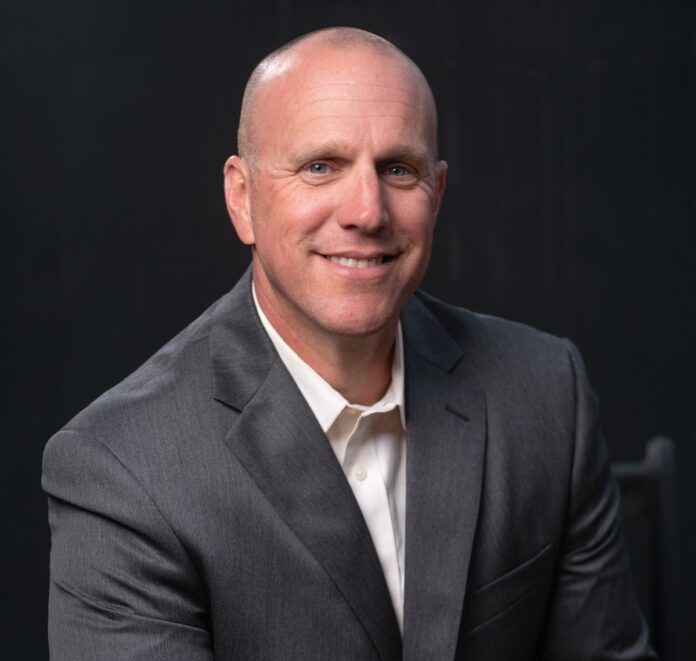Jonathan Peck, 41, describes himself as a Constitutional Sheriff Candidate who is running for the position “to “prevent what happened over COVID” from happening again.
“Closing churches, closing businesses, mandatory vaccinations— all that, I believe, was a violation of our God-given and Constitutional rights. If the person at the top had stepped up and said, ‘These aren’t laws, we’re not going to enforce them,’ that could have gone a long way and I want to be in that position if and when it happens again,” Peck said.
The California Highway Patrol officer models himself after Riverside county Sheriff Chad Bianco, a former member of the Oath Keepers, which the Southern Poverty Law Center describes as one of the largest far right anti-government groups in the U.S. today. Bianco received regional attention when he said the sheriff is “the last line of defense from tyrannical government overreach” in a September 2021 statement.
To a lesser degree, Peck said he admires Los Angeles county Sheriff Alex Villanueva, who sometimes appears contradictory in his stances. Villanueva claimed Los Angeles Times reporter Alene Tchekmedyian was in possession of stolen property by obtaining leaked video footage confirming use of force in the prison system, yet also halted prisoner transfers to Immigration and Customs Enforcement detention centers, claiming poor conditions.
Locally, Peck said he works closely with many county deputy sheriffs, although he did not elaborate on what type of work assignments he typically completes during joint efforts. Peck said there is nobody at the top of San Diego county’s leadership he wants to emulate.
His endorsements are also from outside the county: City of San Jacinto council member Brian Hawkins and California Governor candidate Robert Newman.
He is currently involved in a lawsuit plaintiff Corinna Wirthkirchner brought against the state of California, Peck and other law enforcement officers in June, 2021.
Peck had not claimed any financial contributions to his campaign as of March 11.
If elected, the first issue he would address, he said, is staffing county jails in an effort to reduce high death rates over the past 15 years as reported in a 2022 California state audit.
“Staff works a 12-hour shift and then gets held over for another six hours. I don’t think you can honestly expect someone in the sixteenth or seventeenth hour of their shift to do the same quality of work they’re going to do in the first or second hour. If people are fatigued, that leads to mistakes and mistakes lead to death, I think,” Peck said.
He would also like to increase medical personnel and how frequently arrested persons are evaluated.
“So many of the people going into the jails are under the influence of drugs and have medical problems, psychological problems and there’s a nurse who evaluates them on intake but after that, they’re expecting deputies to make medical evaluations of these people and I don’t think they’re qualified for that,” Peck said.
He believes follow up evaluations would provide more information on individuals who might present very differently after their sobriety levels change.
Peck also believes it is important to get information out to news media “very quickly” to promote transparency, including information on in-prison deaths.
“You have to protect the criminal case and the deputies involved, obviously, but getting that video out to the media as soon as possible and being transparent, you know, all the context should be reported and there should be nothing to hide. If there’s something bad, admit it and take the proper action against it. Body-worn cameras are a godsend in that regard,” Peck said.
Social media can also provide an opportunity to show “the good things” that happen, he said and putting out videos of positive moments “would go a long way” across communities.
To further reach diverse communities across the county, Peck said he would like deputies to engage in more public outreach events so “they start to see us as people, not law enforcement only” such as the Coffee With a Cop series where residents can casually talk with uniformed officers.
“The problem right now with low staffing is people just run from call to call and there’s not a lot of down time but I think making extra time to actually talk to people would go a long way and could actually reduce the calls in the future,” Peck said.
In exchange, he would like deputies to get a feel for immigrant and refugee communities by going out and talking with them.
“For example, with the Chaldean community, going to their churches and being available to answer questions and address concerns their community has, that would be a good, central hub for their community. We need to find where communities congregate, go there, be available,” Peck said, although he did not say how deputies would overcome any potential language barriers or address possible adverse attitudes to authority due to different cultural values.
He also would like to see Campus Resource Officers focus on communication, utilized “almost as a recruiting tool and interact with students as much as possible” to ideally create a more positive relationship.
“If there’s not that divide of ‘this is someone here to discipline us’ so much as ‘this is someone here to keep us safe’ and if most of the students liked the resource officers, I think you’d have less disciplinary problems on campuses,” Peck said.
Repeatedly, he said he supports community outreach but ultimately believes the Sheriff should focus on law enforcement.
He stands against hate crimes and although he does not believe they can be entirely prevented, would like them to be prosecuted “to the fullest extent of the law” in conjunction with the District Attorney.
Although he puts forth a conservative, pro-life stance on his campaign website and believes marriage should exist solely between one man and one woman, he said everyone is equal under law and he would treat everybody the same.
“My personal beliefs aren’t going to affect the way I protect people. I think everybody’s entitled to the protection of law enforcement, no matter what,” Peck said.
He also sees law enforcement as integral to controlling homelessness.
“When people are in front of businesses, scaring away customers, you need to make sure that doesn’t happen,” Peck said, although he did not cite any law against public presence.
“I don’t believe they should be allowed to have all these belongings on public property. We need the sidewalks for walking, we need the streets for driving, we can’t just have homeless camps there,” Peck said.
The county Sheriff’s Homeless Assistance Resource Team is a great resource, he said, along with the Psychiatric Emergency Response Team who both work alongside law enforcement to connect homeless individuals with behavioral health care and support systems.
“In the past, the homeless have been on the streets, in a jail or in a hospital and none of those places are good for them. So, the things they’re setting up like shelters for homeless that aren’t jail, where they’re not clogging an emergency room, they’re a
better step. That’s not the full solution but it’s better than what we have had. I don’t see a magic fix for any of this,” Peck said.
“I’m not a politician. I was asked by members of my community to run for this and I was looking for any reason to say no because I like what I’m doing now but I couldn’t come up with any good reason that wouldn’t make me a hypocrite,” Peck said, since he told his kids it was up to everyone to keep officials from overstepping their authority.














